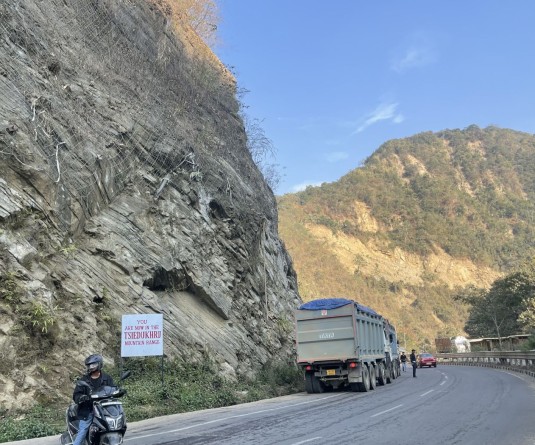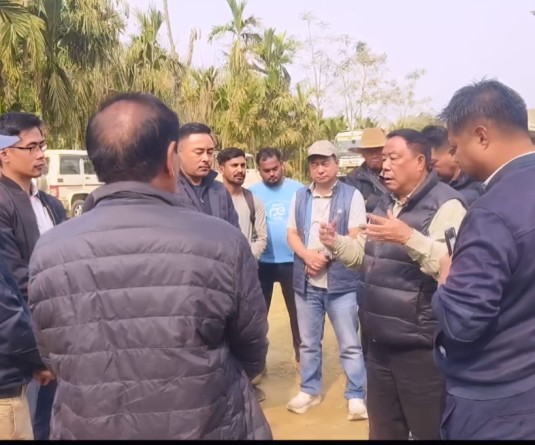Speakers, organizers and participants of the second State Level Multi-Stakeholder Consultation on Sustainable Developmental Goals (SDGs) 2030 held in Tuensang on April 28. (Morung Photo)

Morung Express News
Tuensang | April 28
The second State Level Multi-Stakeholder Consultation on Sustainable Developmental Goals (SDGs) 2030 reflected on the much needed progress in the education, employment and productivity sectors of the State in order to attain Nagaland’s Vision 2030.
The meet focused on identifying gaps and lapses in the implementation of SDGs and was organized by the National Foundation for India, co-funded by European Union and hosted by Can Youth, ARK Foundation and Dolen Thangjam Society in Tuensang on April 28.
Niketu Iralu, Peace Activist; Angbhen Phom, Women Secretary, Phom Baptist Churches Association; and Pangsha Chingmak, Entrepreneur were the panelists.
Pangsha Chingmak said that with little or no scope for the private sector, the Eastern Nagaland districts are way below par in comparison to the rest of the Nagaland.
He mentioned that 45% of the total population of Nagaland is in Eastern Nagaland, of which 60-70% are engaged in agriculture. “To envision the Nagaland government’s Vision 2030, a lot has to be done looking at the percentage of the agriculture population,” he stated.
“One-third of total land area in Nagaland is covered by Eastern Nagaland and there is not a single National Highway in Mon and Longleng districts. Out of five hydro projects, four are in eastern Nagaland but still many villages are not electrified. There are four international trade centres in Nagaland out of which three are in Eastern Nagaland but it needs to be operational and developed. Not a single industry to mention but we have considerable mineral resources which are yet to be enhanced,” he added.
Chingmak further stated that 20 to 30 thousand students graduate every year while only 1000 to 1500 government jobs are created. He therefore called for efforts to increase skill development to ensure that new graduates are employable.
Speaking on peace building, Niketu Iralu said that “our response produces our solution.” He said that there are always two possibilities, one that challenges and the other that tempts. He called for choosing the option that challenges.
“What needs or must be done in any situation? Doing the right thing in my way or God’s way? Clear up the part where you are not happy. Be honest and be transparent. Peace building becomes possible when trust comes in,” he stated.
Angbhen Phom meanwhile spoke on the need for inclusive and quality education and suggested several measures to attain these goals.
Among them were specialized classrooms for children with special needs, counseling facilities, sensitization on first aid etc.
Earlier, Kumar Ramnikant, IAS, Deputy Commissioner stated that the quality education is being hampered by issues relating to proxy teachers, school infrastructure etc. He also mentioned that there is a lack of competition among schools, teachers and students.
Ramnikant meanwhile said that he was quite happy to see the freedom of women in Nagaland. However, he pointed out that representation of women in societies, institutions etc is very less. “How many tribal hoho presidents, MLAs, ministers, CMs or pastors are women?” he questioned.
The welcome note and keynote address was delivered by Imsutoshi, Programme Officer, NFI and the event was hosted by O Akum, Post Graduate Teacher.
After the panellists presented their cases, a question and answer session was held. Later, the participants were divided into four groups to discuss on education and health, economic growth and development, environment and peace, justice and accountability. After which, a member from each group gave a presentation on identified gaps, challenges and way forward from their topics.
The day ended with a closing remark and prayer by Rev Achu Chang, Executive Secretary, Chang Baptist Lashong Thangyen.





